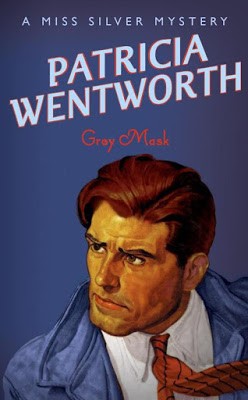
As a person who has had a love of Agatha Christie inculcated in me from the years of my earliest literacy by older female relatives on both sides of my family, I am the first to admit that I am less than conversant in other great mystery novelists of the same period. It took me until my 30s to discover John Dickson Carr, for example – arguably the greatest of the so-called “locked room mystery” writers. My family bookshelves just didn’t deign to notice the existence of any detectives that weren’t Miss Marple, Hercule Poirot, or (grudgingly) Tommy and Tuppence Beresford*. No surprises, then, that Patricia Wentworth has only just appeared on the horizon of my literary radar**.
Until about a week and a half ago, Ms Wentworth was, to me, merely a name referred to in the comments section of an internet article discussing the “cozy” genre of detective novels (of which I am firmly in favour as a principle, though the quality of its denizens is sadly variable). At some point, she reached the top of my to-read list, and I picked up the first novel in the series following the career of a detective called Miss Maud Silver. I haven’t stopped reading them since, and am currently about halfway through those that remain in print. (Sadly, it seems that some of them do not.) This is who I am now, and you shouldn’t expect anything else from me any time soon.
To call Miss Silver a proto-Marple would be an error; the only thing they really have in common is that they are both women for whom menopause has apparently come and gone. (Plenty of people on the internet do, of course, consider them to be cut from the same cloth, presumably because all women who can no longer reproduce are regarded as functionally identical.) Miss Silver is a former governess with a school-room stare; she maintains a private enquiries agency in London; she appears to lack, unlike Miss Marple, an independent income, meaning that her business is her means of support. The fact that her doors are open to the public means that Wentworth is not required to test the boundaries of the suspension of disbelief by coincidentally placing her on the scene of a dozen different country-house murders, as Dame Agatha tended to do. Nevertheless, the murders she investigates tend to be of a similar quality, involving the kinds of people with household staff, for whom a drawing room is not the same thing as a parlour.
There are a lot of things that I love about these books, which is just as well since I’m now sadly addicted to them and ripping through them at a rate slightly above one per day. It’s a lot of fun to read a set of novels like these in order for the first time, and see characters from previous novels popping up from time to time – frequently, because they recommend Miss Silver to her subsequent client. Miss Silver has marvellous relationships with the police officers she encounters, one of whom was a child under her tutelage. My favourite is one Detective Sergeant Frank Abbott, a handsome and fashionable young man, whose regard for her develops into something approaching idolatry over the course of several books, proceeding from a startlingly hipsterish ironic attachment to genuine affection and respect. You can usually spot the innocent parties because they’re young lovers; inevitably, by the conclusion of a book, at least one couple will have become engaged and/or married, frequently after Miss Silver clears one or both of their names. (She can often be spotted knitting baby clothes for them in subsequent novels.)
If I have a complaint, it’s that some of the male/female relationships are not what I would ideally prefer. I know it was the 30s or whatever, but it still makes me uncomfortable to see women coupled off with moody and/or aggressive men who show no sign of being likely to change, when the books clearly regard this union as a favourable outcome. Jokes about how women shouldn’t say that “or I’ll beat you” may not have been meant seriously (and actual abusive relationships are not treated with anything like sympathy), but I don’t find jokes like that very funny. However, these are relatively rare occurrences, of a kind which are likely to pop up in any novel from around this period, and overall the good far outweighs the bad.
In addition to the Miss Silver novels, Wentworth has another detective named Ernest Lamb, and a number of stand-alone novels. I will definitely read them; however, I rather suspect that when I surface from Miss Silver in a couple of weeks I’ll need a break to rehabilitate myself and rejoin society.
*These are all Agatha Christie detectives, and shame on you for not knowing.
** Horizon + radar – is this a mixed metaphor? I don’t really know how radar works.